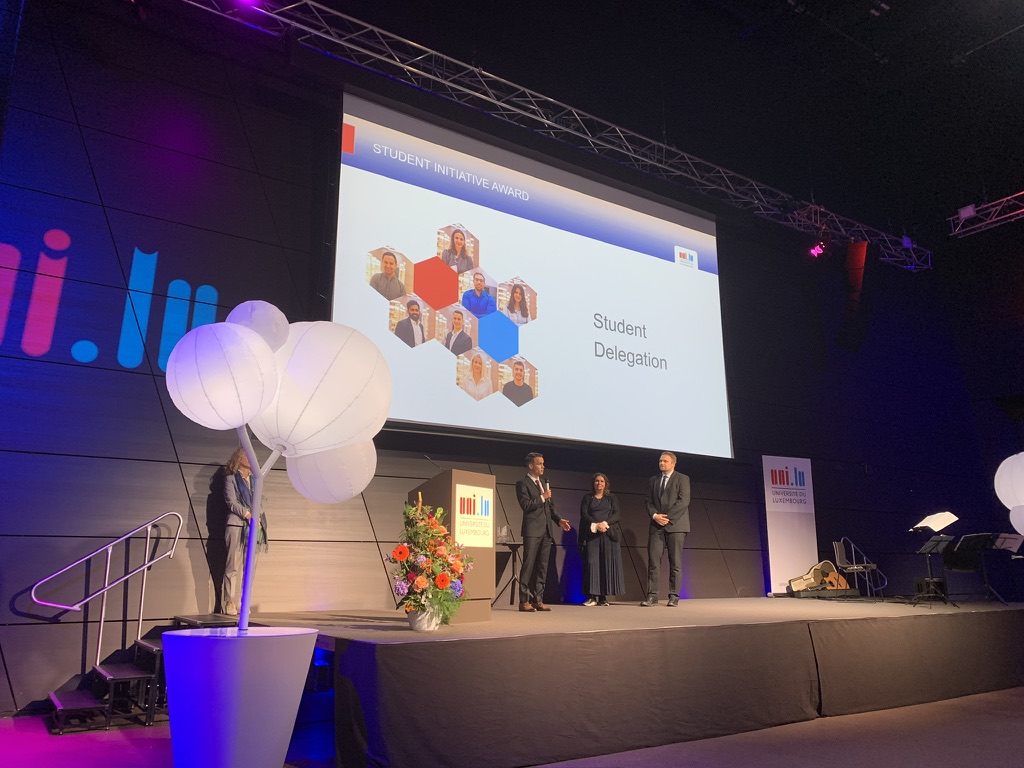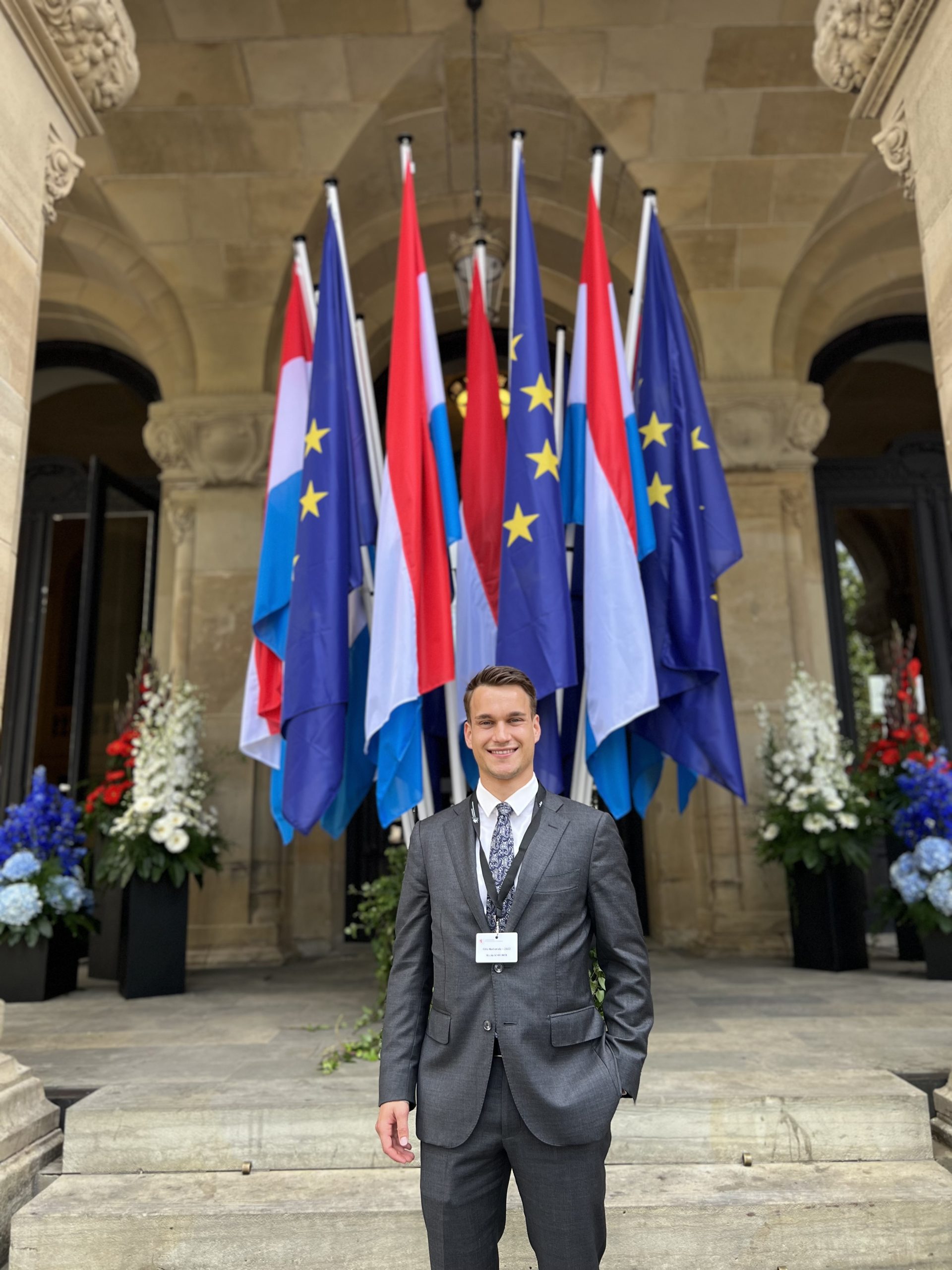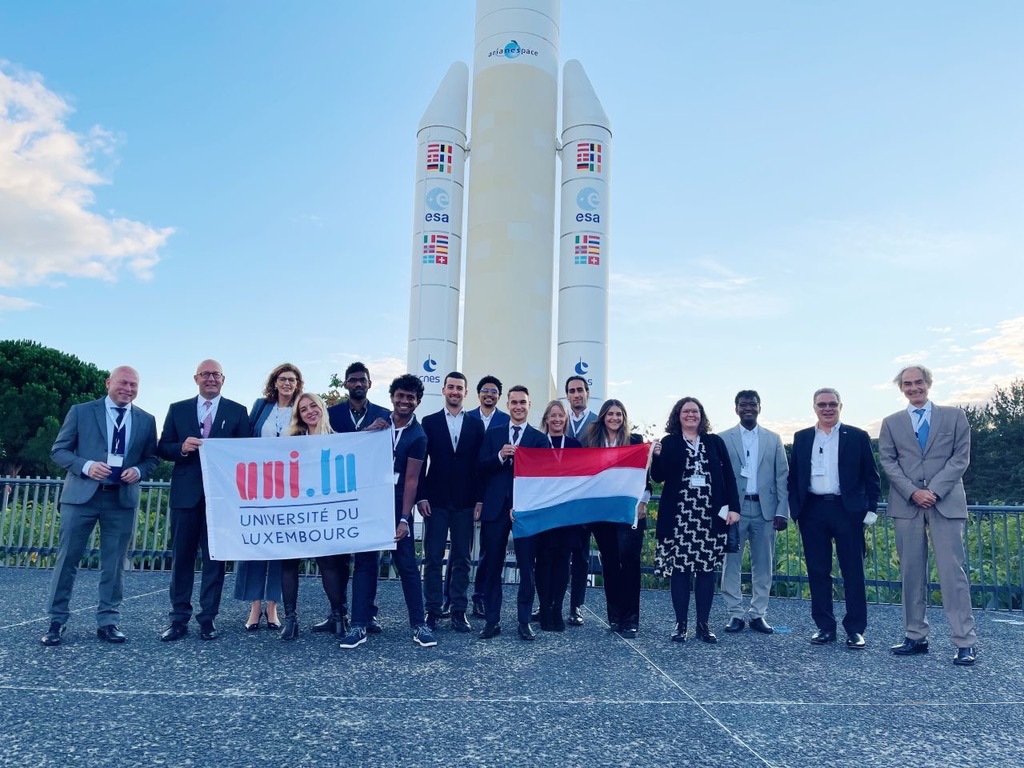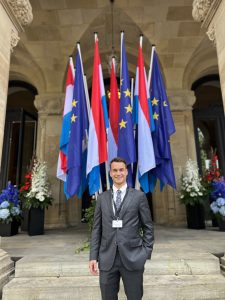Meet Nicola Schreiner, a young Luxembourgish diplomat, a proud double alum of the University of Luxembourg, and former President of the Student Delegation. Nicola earned both his Bachelor in Law and Master in Space, Communication and Media Law at our Faculty, where he developed a deep passion for emerging fields of law, particularly in the area of space and other emerging technologies. He now serves at the Ministry of Foreign and European Affairs in Luxembourg.
We spoke with Nicola about his academic journey, career path, and study choices, as well as his current role as a diplomat.
Nicola, you are a double alum of the University of Luxembourg, having completed both your Bachelor’s and Master’s there. Why did you choose this University for both degrees?
I chose it for my Bachelor’s degree due to its unique transnational feature, allowing me to be exposed to different fields of law across various jurisdictions while pursuing my passion of playing football at the highest national level. It also offered interesting exchange opportunities, and I spent six months in China as part of an exchange programme. For my Master’s, after studying abroad in Leiden, I saw the University of Luxembourg’s potential for growth and evolution, and I was very eager to come back and contribute to that evolution in some form. So, when I returned, I also had the honour to become the President of the Student Delegation.
And, of course, the Master programme in Space, Communication and Media Law fitted my needs and aligned with my deep interest in space law. I realized that one of the few places to continue studying space law was either at Leiden or the University of Luxembourg, but I was eager to return to my alma mater.

The Student Delegation won the Student Initiative Award in 2021
How did you find the study experiences in Luxembourg, China, and the Netherlands? Were there notable differences?
Each experience was different. I think the University of Luxembourg offers a hybrid version of the traditional French teaching system in law, where you have lectures, take notes, and try to consume and digest the content for exams while, at the same time, it has small groups, allowing students to apply the law and learn how to practice it, which is a key element of the Dutch system – very practice-oriented in the application and teaching of law.
Especially in the Master’s, smaller classes are a real advantage for in-depth discussions and interactions.
For my taste, it’s the best of both worlds.
In China, the programme was more limited due to the nature of the exchange, focusing on comparative legal traditions. However, it was valuable for international exposure and cultural exchange.
I noticed you participated in the legal clinic (la Clinique du Droit). What did this experience bring you?
The legal clinic provided me with hands-on experience, showing how law can help people in real-world situations. For example, I worked on consumer law cases and I felt that I was making a contribution to people in need of help, which allowed me to go beyond the mere theoretical aspects of the law.
Can you tell me more about your current role as diplomat? What does your job entail?
I am part of Luxembourg’s diplomatic service under the Ministry of Foreign Affairs. At the start of my career, I was responsible for the relations between the State and the numerous international and European organizations based in Luxembourg. Currently, I work on topics related to international trade and the rule of law, representing Luxembourg in some working parties of the Council of the EU during discussions about regulatory frameworks, trade, and foreign investments.

How does your daily job look like?
An important part of my job entails writing and reviewing reports related to my fields of responsibility. This includes consulting with colleagues and other competent Ministries to determine Luxembourg’s positions and defending them in various meetings in Brussels, whether during negotiations or in the context of the European Union’s daily business.
It also involves preparing notes and keeping the minister informed about developments and news from around the world that could impact the topics I am following, both globally and in Luxembourg itself. Staying up to date is crucial. Of course, there is also an administrative aspect, which involves writing reports, sending communications, and discussing and coordinating with colleagues from other ministries or even other countries to prepare for various meetings and agenda topics.
What skills are essential for a diplomat today?
First, I consider it to be a very people-oriented role requiring effective collaboration and communication. A big part of the job requires to gather, convey, and communicate information precisely and cautiously.
Additionally, it involves interacting with people from all over the world, making cultural adaptability crucial. On the other hand, it is also a very administratively heavy job, so being able to read a lot of material and to write effectively is extremely important. Language skills are also incredibly useful in this field.
Lastly, and perhaps most importantly, being a diplomat means embracing your role as a public servant. It calls for a deep sense of duty and pride in representing your country’s interests and advocating for its positions. This commitment often involves stepping beyond your comfort zone – living abroad, engaging with diverse cultures and contributing to meaningful dialogue and cooperation.
Reflecting on your studies, which aspects have been most practical for your career?
Legal analysis of legal frameworks and international treaties has been very helpful in terms of understanding the governance of international relations.
Law studies are very writing-intensive which helps to be able to clearly articulate your thoughts. This is especially important in this field, where you have to weigh your words carefully. Reasoning and argumentation skills were invaluable, especially in a field where precise communication is key.
Beyond the classroom, intercultural exchanges during my studies prepared me for global collaboration. Making friendships and fostering connections with people from all over the world has been very important, and I think it’s something that has been neglected during COVID or in its aftermath.

University of Luxembourg together with its student delegation at the Cité de l’Espace in Toulouse (France) for the launch event of UNIVERSEH in 2021

Nicola (in the middle) with the former Rector of the University of Luxembourg, Stéphane Pallage (on the right)
What advice would you give to current or future law students, particularly those interested in space law?
For law students, I would recommend looking for niches in the legal field that you are passionate about and pursuing them. There is always a need to apply traditional legal concepts to new scenarios, and you can build a career by doing just that. By pursuing a niche, you will not only expand your legal knowledge and personal development but also become a unique asset for legal firms or other industries making you stand out compared to others who may have pursued more conventional paths.
For students in general, I encourage you to take full advantage of your time at university to take risks, and go abroad. Step out of your comfort zone-whether intellectually, physically, or culturally-because studying provides a safe environment for exploration. You can see, learn, and experience things that will be much harder to do once you enter the professional world. I believe that the ultimate value of your studies lies not just in the material you learn, but in the character you cultivate along the way.
Another important advice is to be active and engaged. I think the Student Delegation at the University of Luxembourg is a great way to do so, but all the other student associations as well. Contributing to society is essential, and it requires individuals who are genuinely committed to making a difference. Usually, universities are small ecosystems in themselves, so start there. That will help you and others along the way.
It’s a great and very practical advice. Is there anything else you would like to add?
As advice to Luxembourgish students, I would encourage them to stay at the University of Luxembourg, at least for their Bachelor’s, or perhaps return for their Master’s. While it’s important to go abroad and gain diverse experiences, the University of Luxembourg offers high-quality education in such an international environment that, at times, you might forget you’re in Luxembourg itself. It’s about creating value and fully leveraging the excellent education available here.
As a Luxembourgish student myself, I continue to see the tremendous potential of the University of Luxembourg, and this is something we must continue to push forward.
—
All images ©Nicola Schreiner
